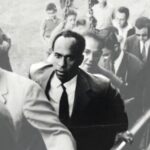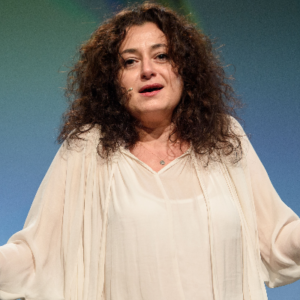Illustration by Krishna Bala Shenoi.
Talk Easy with Sam Fragoso is a weekly series of intimate conversations with artists, authors, and politicians. It’s a podcast where people sound like people. New episodes air every Sunday, distributed by Pushkin Industries.
*
As a fourth generation border resident in El Paso, politician Beto O’Rourke has long been making the case for immigration reform. He’s continued to do so this summer, as the humanitarian crisis at the Texas-Mexico border has accelerated under Gov. Greg Abbott.
After a check-in with Dad Fragoso, we sit with O’Rourke to unpack the severe anti-migrant tactics carried out under Operation Lone Star, the dangerous rhetoric that delivered this crisis, and the checkered history of immigration reform in Texas. We also walk through the focus of Beto’s new book, We’ve Got to Try: How the Fight for Voting Rights Makes Everything Else Possible, the four-year aftermath of the El Paso shooting, and why he continues fighting for change in the state.
On the back-half, O’Rourke reflects on his recent Gubernatorial campaign, how the Texas electorate has shifted since 2018 Senate run, his unwavering belief in people, how he hopes President Biden mitigates the cruelty at the border, and to close, a story about fatherhood.
Subscribe and download the episode, wherever you get your podcasts!
From the episode:
Sam Fragoso: On August 2nd, 2019, Texas Governor Abbott sent out a fundraising email accusing Democrats like yourself of, “plotting to transform Texas and our entire country through illegal immigration.” The email continues, “if we’re going to defend Texas, we’ll need to take matters into our own hands.” The next day, in a Walmart in your hometown of El Paso, a 21 year old gunman drove 600 miles across Texas. He went into that Walmart, took matters into his own hands, and killed 23 people. Those people were children, mothers, fathers, grandparents. He did this according to his own manifesto, as a response to the “Hispanic invasion of Texas.” Citing the Great Replacement Theory, the gunman claimed to be “defending my country from cultural and ethnic replacement brought on by an invasion.” Those words that we’ve been batting around, on that day, they produced real action, and they produced real lives lost. I wonder, as a father and a resident of El Paso, how you hold the weight of all this four years later?
Beto O’Rourke: I think the connection you draw between the rhetoric and language used by people in positions of power—and the actions that that rhetoric inspires—is so important because you just made the case that the massacre on the 3rd of August 2019 would not have happened otherwise.
As an El Pasoan who’s lived here my entire life, I’ve known that long before Donald Trump, the border was the focus of so many of our fears of people who did not look like or speak like the majority of Americans coming into this country and changing this country as they came, much as the Irish did in the 19th century and southern Europeans and people from all over different parts of the world at different times, inspiring that kind of fear and anxiety.
But for much of my life, it has been here, literally in El Paso, where we meet the rest of the world. Where the rest of our country is supposed to be afraid. Donald Trump would routinely talk about El Paso as a dangerous place, literally lying. No basis in truth whatsoever, but those lies were able to take hold because people had been conditioned for so long to think about immigrants in this way and think about the border in this way. So, I just knew that it’s really important that we understand the power of that language and that rhetoric, and we don’t just say that what those guys are telling you is wrong, but that we also share our own stories— because if we don’t tell our stories, somebody else will tell it for us. That was what Trump and Abbott and others were so successful at doing.
The things you and I have been talking about today can seem intractable or impossible. Like, we haven’t had immigration reform since 1986; we’ll never get it. We had school shootings, and they only seem to increase; it will never get better. The planet is warming, we’re incapable of mounting a political response; we might as well give up. But in this book, I tell the story of people, including those from El Paso, who were denied the ability to vote because they were Black and fought for decades to win voting integration in Texas. By 1944 inspired LBJ to pass the Voting Rights Act in 1965. That took generations to get done. So, when it comes to this question of rhetoric and the damage it does to very real human lives in places like El Paso, we can’t give into this, and we can’t allow that massacre in 2019 to be the end of the story. It must push us to do better, to do more, to engage with our fellow Americans, offer them the truth about who we are, what we mean, and what we contribute to the rest of this country. I think that has to be part of the conditioning that sets the stage for whoever the President is that ultimately leads on immigration reform and ending the tragedy and the needless death that we’re seeing on the border today.
__________________
Beto O’Rourke is a fourth-generation Texan, born and raised in El Paso where he has served as a small business owner, a city council representative and a member of Congress. He founded and currently leads Powered by People, a Texas-based organization that works to expand democracy and produce Democratic victories through voter registration and direct voter engagement. Beto is married to Amy O’Rourke and together they are raising Ulysses, Molly and Henry in El Paso’s historic Sunset Heights.
Sam Fragoso is the host of Talk Easy with Sam Fragoso, a weekly series of conversations with artists, activists, and politicians. His writing has appeared in The Atlantic, Vanity Fair, and NPR. After conducting seminal interviews with icons like Spike Lee, Werner Herzog, and Noam Chomsky, he independently founded Talk Easy in 2016.




















